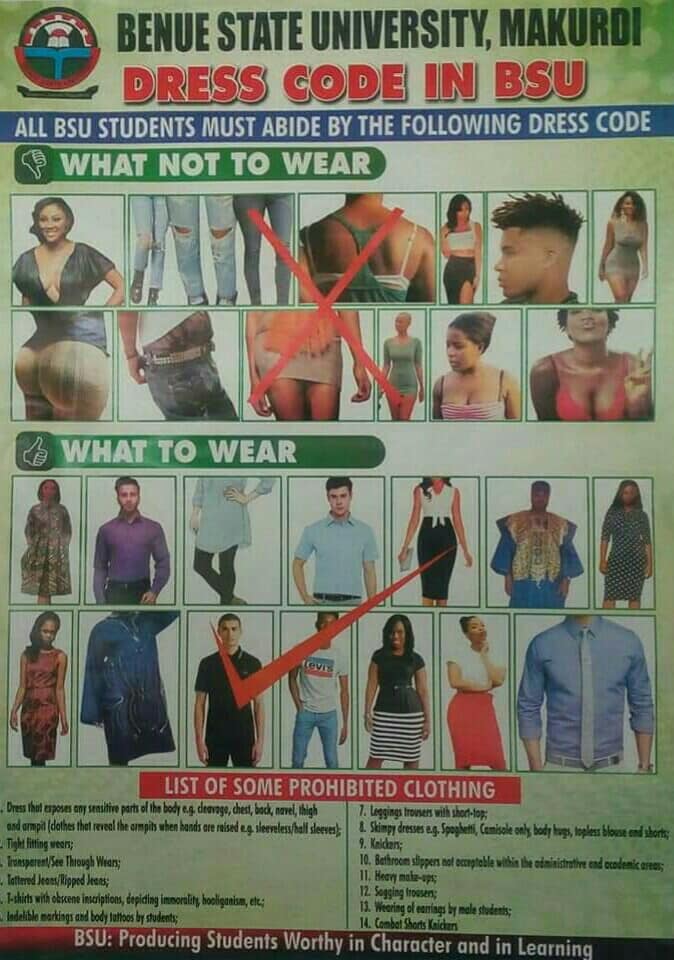Benue State University (BSU) acceptable and unacceptable Dress Code for both female and male students.
After weeks and months of consultations, Management of Benue State University, Makurdi, has announced that the implementation of its policy on Dress Code for her students has come into effect beginning from the 2018/2019 Academic Session which is in its 4th week.
While hinting on the plan to introduce an acceptable Dress Code for students of the University, the Vice-Chancellor, Professor Msugh Moses Kembe said it was intended to instil discipline, restore self-esteem and dignity in students of the University.
Realising that the policy was almost a novelty or strange to some people, the University Management quickly set up a Committee whose main assignment was to sensitize the University Community, especially students and other stakeholders.
The Committee, headed by the Dean of Students Affairs, Professor Joseph Kerker, held series of meetings with Students Union leaders and other relevant stakeholders during which grey areas were ironed out to dispel any misgivings.
There are those who have argued that those admitted to study in a University or any Institution of higher learning are considered adults and therefore need no prescription on any form of sartorial appearance. Those who put up this argument may not be correct because sometimes there may be a deliberate violation of dressing taboos in order to either make a fashion statement, stage a protest or just to attract attention. In other words, dressing is a visual interpretation of human behaviour in response to fashion trends or prevailing social order.
Indeed the question should not even arise concerning the propriety of a Dress Code for students of the University. The truth is that the University already has a Dress Code codified in the University’s Students Handbook which is usually made available to all newly matriculated students. What authorities of the University have done, in consulting with leadership of the Students’ Union and Stakeholders, is a formal resolution to enforce compliance with what has been in existence but lacked enforcement and therefore left a lacuna for non-conformists to take advantage of by dressing any how they wanted.
Another positive example which can be easily pointed out in the University is that of different Faculties such as Management Sciences, Law and even some Departments, like Sociology, whose students have embraced the various forms of Dress Codes, some even in form of Uniforms, without much fuss from the students or any quarters.
The idea of a dress code on campuses is not a new one afterall. It can be recalled that, in 2006, the then Minister of Education of the Federation, Professor Fabian Osuji, did identify the imperative of a Dress Code and encouraged Heads of Tertiary Institutions in Nigeria to introduce Dress Codes in their various Institutions, especially for female students. As reported then, the Minister was “…irked by constant cases of rape on campuses”, and attributed such to “indecent, skimpy and provocative dressing” by particularly female students. The then Minister further argued that introduction of the policy would check promiscuity on the campuses.
It is expected that with the commencement of the enforcement of the Dress Code, apparels that will be classified as inappropriate dressing include “Exposing Underwears or intimate parts of the body”, “Too Transparent” or revealing clothing, overtight or “body hug” and tattered Jeans while for Male students wearing of earrings, plaiting of hair or dreadlocks will be considered offensive.
Whichever side the arguments swing, the need to ensure decent dressing and good morals and lifestyle among the youths cannot be overemphasized; the policy should therefore be seen as a deliberate and conscious effort to build morally upright and descent students who are being prepared to become adults and leaders in the society.
Afterall, authorities of the University as well as Lecturers and non-teaching staff, stand as “Loco Parentis” to the students when they are on campus, away from their homes and so must be thinking of only that which is good for them, now and in the future.
It is therefore imperative that all concerned should join hands with the Standing Committee on the enforcement of the new policy to enable it succeed for the good of not only the University but also the society.
Finally, the old adage should guide us all which says: “as you dress so you are addressed”.
